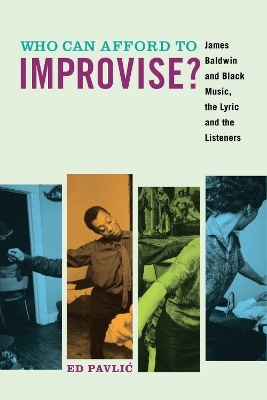
Who Can Afford to Improvise?
Fordham University Press (Verlag)
978-0-8232-6848-1 (ISBN)
- Titel z.Zt. nicht lieferbar
- Versandkostenfrei innerhalb Deutschlands
- Auch auf Rechnung
- Verfügbarkeit in der Filiale vor Ort prüfen
- Artikel merken
More than a quarter-century after his death, James Baldwin remains an unparalleled figure in American literature and African American cultural politics. In Who Can Afford to Improvise? Ed Pavlić offers an unconventional, lyrical, and accessible meditation on the life, writings, and legacy of James Baldwin and their relationship to the lyric tradition in black music, from gospel and blues to jazz and R&B. Based on unprecedented access to private correspondence, unpublished manuscripts and attuned to a musically inclined poet’s skill in close listening, Who Can Afford to Improvise? frames a new narrative of James Baldwin’s work and life. The route retraces the full arc of Baldwin’s passage across the pages and stages of his career according to his constant interactions with black musical styles, recordings, and musicians.
Presented in three books — or movements — the first listens to Baldwin, in the initial months of his most intense visibility in May 1963 and the publication of The Fire Next Time. It introduces the key terms of his lyrical aesthetic and identifies the shifting contours of Baldwin’s career from his early work as a reviewer for left-leaning journals in the 1940s to his last published and unpublished works from the mid-1980s. Book II listens with Baldwin and ruminates on the recorded performances of Billie Holiday and Dinah Washington, singers whose message and methods were closely related to his developing world view. It concludes with the first detailed account of “The Hallelujah Chorus,” a performance from July 1, 1973, in which Baldwin shared the stage at Carnegie Hall with Ray Charles. Finally, in Book III, Pavlić reverses our musically inflected reconsideration of Baldwin’s voice, projecting it into the contemporary moment and reading its impact on everything from the music of Amy Winehouse, to the street performances of Turf Feinz, and the fire of racial oppression and militarization against black Americans in the 21st century.
Always with an ear close to the music, and avoiding the safe box of celebration, Who Can Afford to Improvise? enables a new kind of “lyrical travel” with the instructive clarity and the open-ended mystery Baldwin’s work invokes into the world.
Ed Pavlić is Professor of English and Creative Writing at the University of Georgia.
Introduction BOOK I The Uses of the Blues: James Baldwin's Lyrical Quest 1. "Not the country we're sitting in now": Amputation/Gangrene Past and Present 2. Blues Constants, Jazz Changes: Toward a Writing Immune to Bullshit 3. "Making words do something": Retracing James Baldwin's Career BOOK II The Uses of the Lyric: Billie's Quest, Dinah's Blues, Jimmy's Amen, and Brother Ray's Hallelujah 4. Billie Holiday: Radical Lyricist 5. Dinah Washington's Blues and the Trans- Digressive Ocean 6. "But Amen is the price": James Baldwin and Ray Charles in "The Hallelujah Chorus" BOOK III "For you I was a flame": Baldwin's Lyrical Lens on Contemporary Culture 7. On Camden Row: Amy Winehouse's Lyric Lines in a Living Inheritance 8. Speechless in San Francisco. "A somewhat better place to lie about": An Inter-View 9. "In a way they must ...": Turf Feinz and Black Style in an Age of Sights for the Speechless 10. "Shades cannot be fixed": On Privilege, Blindness, and Second Sight Conclusion: The Brilliance of Children, the Duty of Citizens Acknowledgments Notes Bibliography Index
| Erscheint lt. Verlag | 12.10.2015 |
|---|---|
| Verlagsort | New York |
| Sprache | englisch |
| Maße | 152 x 229 mm |
| Themenwelt | Literatur ► Biografien / Erfahrungsberichte |
| Kunst / Musik / Theater ► Musik | |
| Geisteswissenschaften ► Sprach- / Literaturwissenschaft ► Anglistik / Amerikanistik | |
| Geisteswissenschaften ► Sprach- / Literaturwissenschaft ► Literaturwissenschaft | |
| Sozialwissenschaften ► Soziologie | |
| ISBN-10 | 0-8232-6848-9 / 0823268489 |
| ISBN-13 | 978-0-8232-6848-1 / 9780823268481 |
| Zustand | Neuware |
| Haben Sie eine Frage zum Produkt? |
aus dem Bereich


